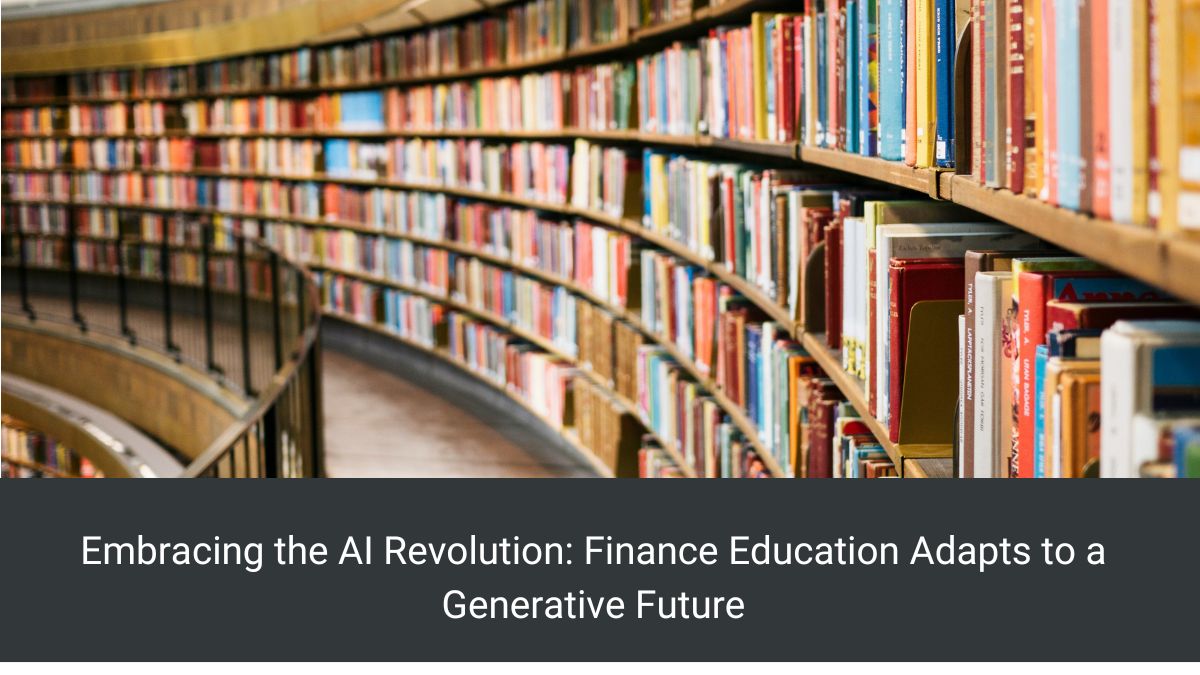AI
Embracing the AI Revolution: Finance Education Adapts to a Generative Future

The Transformative Power of Generative AI in Finance
As the world of finance navigates the ever-evolving landscape of technology, the emergence of generative artificial intelligence (AI) presents both unprecedented challenges and remarkable opportunities. This disruptive force is poised to redefine the very essence of the finance and accounting professions, ushering in a new era of efficiency, innovation, and human-machine collaboration.
Enhancing Productivity and Streamlining Processes
According to a joint research study by Evercore and Visionary Future, the service sectors, including finance and legal, are highly susceptible to disruption by AI. However, rather than outright job replacement, the study suggests that generative AI will primarily enhance productivity, particularly in high-value roles commanding annual salaries exceeding $100,000.
This sentiment is echoed by industry experts who have witnessed firsthand the transformative potential of AI in finance. Stuart Tait, chief technology officer for tax and legal at KPMG UK, describes it as a “game changer for tax,” capable of handling complex tasks beyond routine automation with remarkable accuracy and efficiency.
A Personal Perspective: Embracing the Future, Preserving the Core
As someone deeply invested in the field of finance, I cannot help but marvel at the remarkable strides being made in integrating AI into various aspects of the industry. From automating data entry to streamlining research and analysis, the potential for increased efficiency and productivity is undeniable. However, it is crucial that we approach this technological revolution with a balanced perspective, recognizing the enduring value of human expertise and interpersonal skills.
Redefining Finance Education
To keep pace with these rapid advancements, educational institutions worldwide are actively revamping their finance and accounting programs. Schools like HEC Paris and Imperial College Business School are introducing courses that equip students with the necessary skills to navigate this AI-driven landscape, ranging from data analysis to decision-making using generative AI.
Moreover, institutions such as Cambridge Judge Business School and Bayes Business School in London are incorporating machine learning concepts and practical applications into their curricula, ensuring that graduates are well-versed in the latest technologies shaping the finance industry.
Cultivating the Skills of Tomorrow
While technical proficiency is undoubtedly crucial, experts across the board emphasize the enduring importance of soft skills, such as critical thinking, leadership, and networking, in this evolving professional landscape. Angela Gallo, director of the banking and international finance MSc at Bayes Business School, highlights the significance of interpersonal skills in a more automated sector, suggesting that AI could potentially restore the value of client relationships.
Gérard Despinoy, executive director of the Master in Finance at Essec Business School, underscores the importance of programming languages like VBA, Java, R, and Python, as mastery of these tools can streamline financial analysis, automate routine tasks, and pave the way for innovative financial solutions.
Furthermore, industry certifications, online learning platforms, and a commitment to lifelong professional development are increasingly vital for finance professionals seeking to stay competitive in an ever-changing job market, as emphasized by Andrew Harding, chief executive of management accounting at the Association of International Certified Professional Accountants.
Embracing New Roles and Career Paths
As the integration of AI in finance gathers momentum, a myriad of new roles and career paths are emerging. Marc Chapman, a career consultant at Essec, cites positions such as algorithmic trader and AI financial analyst, where machine learning techniques can be leveraged to analyze financial data, predict market trends, and automate processes.
However, amidst these transformative changes, experts stress the enduring relevance of core competencies in accounting and finance. As Harding eloquently states, “Technologies like AI are tools for professionals to use as powerful co-pilots, not replacements.”
Embracing the Future with Adaptability and Foresight
As the finance industry stands at the precipice of an AI-driven revolution, it is imperative that students, professionals, and educators alike embrace a mindset of adaptability and foresight. While the integration of generative AI may render certain tasks and skills obsolete, it simultaneously opens up new avenues for growth, innovation, and professional fulfillment.
In the words of Feng Li, professor and chair of information management at Bayes Business School, “AI is a long way from automating jobs. The future belongs to those who can use AI to do their jobs more efficiently and effectively.”
By striking a delicate balance between technological proficiency and the preservation of human expertise, the finance industry can harness the transformative power of generative AI while upholding the core values that have long defined this profession. As we navigate this uncharted territory, let us embrace the opportunities before us, continuously adapt, and shape a future where human ingenuity and artificial intelligence coalesce to drive progress, prosperity, and a deeper understanding of the intricate world of finance.
